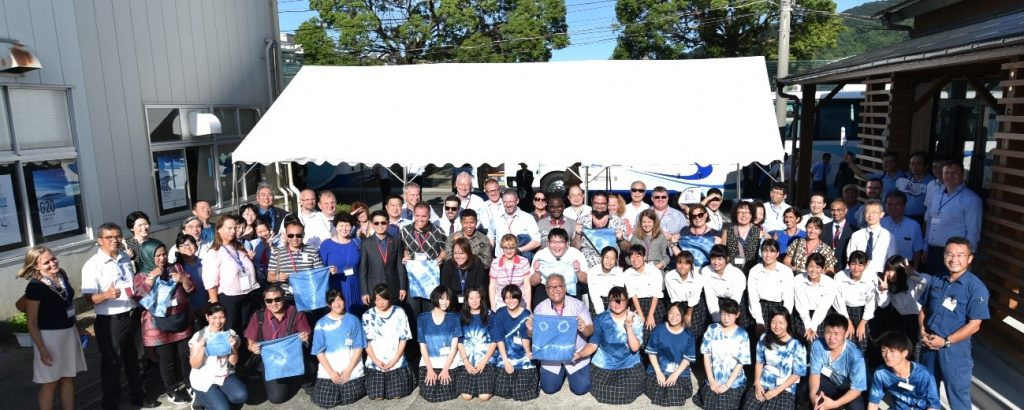
G20 International Conference on Consumer Policy
In 2014, the Japanese government put into place a “City, People & Work Creation Initiative”, an administrative plan for overcoming population decline and securing potential growth in the future. The plan included provisions for some central government agencies to be relocated (both totally or partially) outside Tokyo. Tokushima Prefecture, located at the eastern edge of Shikoku the smallest of Japan’s four main islands, bid to attract the Consumer Affairs Agency’s relocation. As a result, a branch of the agency opened as a trial in Tokushima in 2017.
The office, named “Office of Consumer Policy Frontiers”, is located within the Tokushima Prefectural Government building, and has about 50 staff permanently stationed there. It manages model projects with a view to nationwide development, as well as research on consumer behaviour and consumer issues, focused mainly in the Kansai, Chugoku and Shikoku regions where its training programmes take place.
Tokushima Prefecture promotes consumer issues within the region and utilises the network of local authorities and other public offices to support the nationwide deployment of these model projects.
Notable examples where the Consumer Affairs Agency and Tokushima Prefecture collaborate are “consumer education for young people” and “promotion of ethical consumption” projects.
Consumer education for young people
In Japan, the legal adult age of majority will be reduced from 20 to 18 from April 2022, the result of a revision of the country’s legal Civil Code. Because of this, young people aged 18 and 19 lose the right to certain protections for minors, and this may lead to a rise in consumer problems.
To prevent these kinds of issues and help young people gain an understanding of responsibilities around contracts, the Consumer Affairs Agency cooperated with Tokushima Prefecture Education Committee to organise consumer education for high schools in the region. Classes are held at all 56 high schools in the Prefecture, using teaching material created by the Consumer Affairs Agency. After evaluating the results, the Financial Services Agency, the Ministry of Justice, the Ministry of Education, Culture, Sports, Science and Technology, and the Consumer Affairs Agency are working together to implement consumer education classes using the same teaching materials at all high schools in Japan in FY2020.
Tokushima is also promoting consumer education from early childhood, such as creating educational materials for middle and elementary school students in the Prefecture based on the high school experience.
Promoting ethical consumption
Tokushima Prefecture also cooperates with the Consumer Affairs Agency in conjunction with municipalities, universities, companies and local organisations to promote awareness of “ethical consumption” as a sustainable behaviour, and in doing so supports initiatives to encourage the spread of ethical consumption both inside and outside the Prefecture.
This cooperation oversaw the start of projects for businesses and citizens’ groups, such as promoting local business bodies decelerations of voluntary initiatives for ethical consumption on Prefecture’s website, as well as establishing the Tokushima Ethical Promotion Council to encourage awareness of ethical products and services to consumers. Also, stakeholders established the Construction of Consumer Civil Society Regulations (commonly known as the ‘Ethical Consumption Ordinance’), holding Ethics Exchange Meetings annually for prefectures and municipalities throughout Japan.
Further, high school students engage in learning and the promotion of ethical consumption by holding events such as the “Ethical Koshien 2019” (koshien meaning ‘schools tournament’) in Japan to present their activities, knowledge, and expectations. Applications from 70 schools nationally lead to 12 schools announcing their initiatives at the finals held in Tokushima, and the Prefecture is championing the spread of ethical consumption for the next generation.
In 2019, during the G20 programme in Japan, a G20 International Conference on Consumer Policy was co-sponsored by the Consumer Affairs Agency and Tokushima Prefecture, and a joint secretariat between the Prefecture and the Consumer Affairs Agency was established. At the meeting held on September 5th and 6th, about 60 representatives from 38 bodies, including delegates from nations and international organisations, gathered in Tokushima Prefecture to discuss the theme of “Emerging Challenges to Consumer Policy in the Digital Age”. Practitioners from each country debating how to deal with new consumer issues caused by digitalisation of the world economy and how to promote SDGs.
With these activities evaluated by the central government, the Cabinet Office decided to establish a permanent hub of Consumer Affairs Agency in Tokushima. The office was restructured into the “Strategic Headquarters for Frontiers of Consumer Policy” on July 30 this year in the Tokushima Prefectural Building, with an expanded scale and newly added functions such as an international relations programme. The aim is to strengthen the consumer environment from the citizens’ point of view in mind and support metropolitan area disrupting government services, as well as the ongoing promotion of work style reforms within ministries, such as using video conferences and other measures. At the same time, there are benefits expected by Tokushima Prefecture, such as regional revitalisation with the relocation of functions away from Tokyo and the resulting job opportunities.
Tokushima Prefecture will continue to collaborate with central government to accelerate consumer affairs and education, and additionally on international cooperation, meaning consumer policy at the local government level will give a meaningful role to the regions alongside central government agencies.

